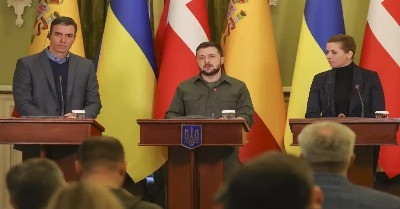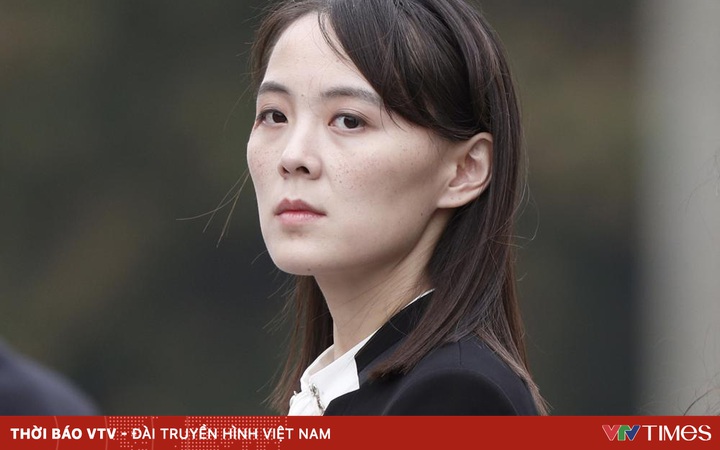The impact of changing the regional world
America’s partners and allies are gradually healing the disagreement on the position surrounding the situation Ukrainedue to the common challenge from fear of new precedents after developments military recently.
Yesterday (May 1), Prime Minister of India Narendra Modi gave a speech one day before departing to visit 3 European countries: Denmark, France and Germany.
 |
The US cruiser USS Antietam during a joint training session with the logistics ship INS Shak Ti of the Indian Navy PACOM |
Connection element
Sheet India Today “My visit to Europe comes at a time when the region is faced with many challenges and choices. Through my commitments, I intend to deepen cooperation with my European partners, important companions in India’s quest for peace and prosperity.”
The statement was made in the context that India and many European countries in general, as well as US allies, do not share a common position on the Ukraine war. Specifically, not only does not support Western sanctions against Moscow, India also does not criticize Russia’s military campaign against Ukraine.
Reply YouthAssoc. secure affordable energy supplies as well as military hardware supplies to India.”
However, India and the West as well as America’s allies in the region share a major challenge: the rise of China. In fact, New Delhi and Beijing have continuously had many tensions at the border in recent times. India is also a member of the “security quartet” (the remaining three members are the US, Japan and Australia) that share a common vision of the Indo-Pacific strategy in the face of China’s rise. .
Especially, after the military developments taking place on world, observers fear that Beijing risks setting a new precedent in the region by using military power to change the status quo in some places. This risk is also an issue that was raised when German Chancellor Olaf Scholz recently visited Japan.
During a joint press conference with Prime Minister Olaf Scholz on April 28 in Tokyo, Japanese Prime Minister Fumio Kishida said the two leaders agreed that as members of the Group of 7 industrialized nations (G7), The two countries have a responsibility to work together to end Russia’s military campaign in Ukraine and restore peace, stability and international order as quickly as possible. In addition, Prime Minister Kishida said that Japan hopes to work closely with Germany as a strategic partner on “various challenges facing the international community, including dealing with China”.
From the above developments, Prime Minister Modi’s upcoming visit to Germany, an influential member of the European Union (EU), may promote bilateral cooperation with India more strongly.
 |
Indian Prime Minister Narendra Modi is about to visit Europe PTI |
Share the same value
Reply Youth On May 1, Professor Alfred Gerstl, an international studies expert at the University of Vienna (Austria), commented: “In the past, German leaders used to visit China more often than Japan. But the meeting on April 28 between the leaders of Japan and Germany showed that the two sides have more in common.
According to this expert, in the Indo-Pacific Strategy Recently, Germany and the European Union promote the so-called policy value-based diplomacy. “These strategic interests of Germany and the EU are very consistent with Japan’s free and open Indo-Pacific strategy,” according to Professor Alfred Gerstl.
He further analyzed that both Japan and Germany are strongly criticizing Russia’s actions in Ukraine. “Both also strongly criticize China’s actions and are concerned about China’s rise,” the expert assessed and forecasted. intentions in the Indo-Pacific”.
Also reply YouthProfessor Yoichiro Sato (International relations expert, Ritsumeikan Asia-Pacific University, Japan) pointed out: “Japan kept its distance from US and EU sanctions against Russia when Moscow annexed Russia. annexed Crimea, but Tokyo changed its stance and imposed economic sanctions on Moscow when Russia launched its military campaign against Ukraine.
Narrow the difference
Clearing disagreements in the stance on the Ukraine war is also considered by observers to be the goal of Japanese Prime Minister Fumio Kishida during his overseas trip, which includes several Southeast Asian countries.
UK and US hold first high-level meeting to discuss Taiwan issue
The Financial Times on May 1, citing sources familiar with the matter, revealed that Kurt Campbell, White House Coordinator for Indo-Pacific, and Laura Rosenberger, the official head of China policy at the US National Security Council, met to discuss with British representatives on Taiwan in early March. The meeting was part of a two-day extension of bilateral representatives on Indo-Pacific strategy. This is the first high-level meeting between Washington and London on the Taiwan issue.
According to sources, Washington wants to strengthen cooperation with European allies, such as Britain, to raise awareness of the concerns of the administration under the President. Joe Biden before Beijing’s recent attitude towards Taipei.
Hypnotic
Typically, Prof. Yoichiro Sato assessed that Prime Minister Kishida’s visit also meant “sending” efforts from the United States in the context that security cooperation between Washington and a number of Southeast Asian partners is slowing down. due to the impact of different positions on the Ukraine issue. Thereby, Tokyo wants to create a common consensus on this issue. According to Prof. Sato, Prime Minister Kishida visited India at the end of March and held talks with Prime Minister Modi for the same purpose.
All aim to strengthen cooperation in the region to deal with common challenges and risks.
at Blogtuan.info – Source: thanhnien.vn – Read the original article here


